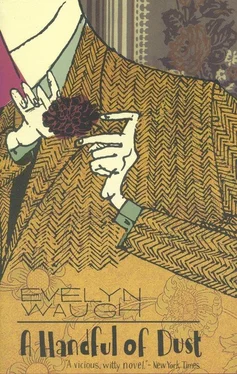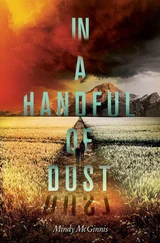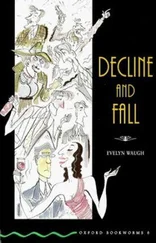Evelyn Waugh - A Handful Of Dust
Здесь есть возможность читать онлайн «Evelyn Waugh - A Handful Of Dust» весь текст электронной книги совершенно бесплатно (целиком полную версию без сокращений). В некоторых случаях можно слушать аудио, скачать через торрент в формате fb2 и присутствует краткое содержание. Жанр: Классическая проза, на английском языке. Описание произведения, (предисловие) а так же отзывы посетителей доступны на портале библиотеки ЛибКат.
- Название:A Handful Of Dust
- Автор:
- Жанр:
- Год:неизвестен
- ISBN:нет данных
- Рейтинг книги:3 / 5. Голосов: 1
-
Избранное:Добавить в избранное
- Отзывы:
-
Ваша оценка:
- 60
- 1
- 2
- 3
- 4
- 5
A Handful Of Dust: краткое содержание, описание и аннотация
Предлагаем к чтению аннотацию, описание, краткое содержание или предисловие (зависит от того, что написал сам автор книги «A Handful Of Dust»). Если вы не нашли необходимую информацию о книге — напишите в комментариях, мы постараемся отыскать её.
It tells of Brenda, Tony and their friends — a wonderfully congenial group who live by a unique set of social standards. According to their rules, any sin is acceptable provided it is carried off in good taste.
A Handful Of Dust — читать онлайн бесплатно полную книгу (весь текст) целиком
Ниже представлен текст книги, разбитый по страницам. Система сохранения места последней прочитанной страницы, позволяет с удобством читать онлайн бесплатно книгу «A Handful Of Dust», без необходимости каждый раз заново искать на чём Вы остановились. Поставьте закладку, и сможете в любой момент перейти на страницу, на которой закончили чтение.
Интервал:
Закладка:
“It is one of the local feast days,” he explained, “and they have been making piwari . You may not like it but you should try some. We will go across to this man's home tonight.”
Accordingly after supper they joined a party of Indians that were assembled round the fire in one of the huts at the other side of the savannah. They were singing in an apathetic, monotonous manner and passing a large calabash of liquid from mouth to mouth. Separate bowls were brought for Tony and Mr. Todd, and they were given hammocks to sit in.
“You must drink it all without lowering the cup. That is the etiquette.”
Tony gulped the dark liquid, trying not to taste it. But it was not unpleasant, hard and muddy on the palate like most of the beverages he had been offered in Brazil, but with a flavour of honey and brown bread. He leant back in the hammock feeling unusually contented. Perhaps at that very moment the search party was in camp a few hours' journey from them. Meanwhile he was warm and drowsy. The cadence of song rose and fell interminably, liturgically. Another calabash of piwari was offered him and he handed it back empty. He lay full length watching the play of shadows on the thatch as the Pie-wies began to dance. Then he shut his eyes and thought of England and Hetton and fell asleep.
He awoke, still in the Indian hut, with the impression that he had outslept his usual hour. By the position of the sun he knew it was late afternoon. No one else was about. He looked for his watch and found to his surprise that it was not on his wrist. He had left it in the house, he supposed, before coming to the party.
I must have been tight last night,” he reflected. “Treacherous drink that.” He had a headache and feared a recurrence of fever. He found when he set his feet to the ground that he stood with difficulty; his walk was unsteady and his mind confused as it had been during the first weeks of his convalescence. On the way across the savannah he was obliged to stop more than once, shutting his eyes and breathing deeply. When he reached the house he found Mr. Todd sitting there.
“Ah, my friend, you are late for the reading this afternoon. There is scarcely another half hour of light. How do you feel?”
“Rotten. That drink doesn't seem to agree with me.”
“I will give you something to make you better. The forest has remedies for everything; to make you awake and to make you sleep.”
“You haven't seen my watch anywhere?”
“You have missed it?”
“Yes. I thought I was wearing it. I say, I've never slept long.”
“Not since you were a baby. Do you know how long? Two days.”
“Nonsense. I can't have.”
“Yes, indeed. It is a long time. It is a pity because you missed our guests.”
“Guests?”
“Why, yes. I have been quite gay while you were asleep. Three men from outside. Englishmen. It is a pity you missed them. A pity for them, too, as they particularly wished to see you. But what could I do? You were so sound asleep. They had come all the way to find you, so — I thought you would not mind — as you could not greet them yourself I gave them a little souvenir, your watch. They wanted something to take back to England where a reward is being offered for news of you. They were very pleased with it. And they took some photographs of the little cross I put up to commemorate your coming. They were pleased with that, too. They were very easily pleased. But I do not suppose they will visit us again, our life here is so retired … no pleasures except reading … I do not suppose we shall ever have visitors again … well, well, I will get you some medicine to make you feel better. Your head aches, does it not? … We will not have any Dickens today … but tomorrow, and the day after that, and the day after that. Let us read Little Dorrit again. There are passages in that book I can never hear without the temptation to weep.”
CHAPTER SEVEN
English Gothic — III
A LIGHT breeze in the dewy orchards; brilliant, cool sunshine over meadows and copses; the elms were all in bud in the avenue; everything was early that year for it had been a mild winter. High overhead among its gargoyles and crockets the clock chimed for the hour and solemnly struck fourteen. It was half past eight. The clock had been irregular lately. It was one of the things that Richard Last intended to see to when death duties were paid and silver foxes began to show a profit.
Molly Last bowled up the drive on her two-stroke motor-cycle; there was bran mash on her breeches and in her hair. She had been feeding the Angora rabbits.
On the gravel in front of the house the new memorial stood, shrouded in a flag. Molly propped the motor-cycle against the wall of the drawbridge and ran in to breakfast.
Life at Hetton was busier but simpler since Richard Last's succession. Ambrose remained but there were no longer any footmen; he and a boy and four women servants did the work of the house. Richard Last called them his `skeleton staff.' When things were easier he would extend the household; meanwhile the dining hall and the library were added to the state apartments which were kept locked and shuttered; the family lived in the morning room, the smoking room and what had been Tony's study. Most of the kitchen quarters, too, were out of use; an up-to-date and economical range had been installed in one of the pantries.
The family all appeared downstairs by half past eight, except Agnes who took longer to dress and was usually some minutes late; Teddy and Molly had been out for an hour, she among the rabbits, he to the silver foxes. Teddy was twenty-two and lived at home. Peter was still at Oxford.
They breakfasted together in the morning room. Mrs. Last sat at one end of the table; her husband at the other; there was a constant traffic from hand to hand to and fro between them of cups, plate, honey jars and correspondence.
Mrs. Last said, “Molly, you have rabbit feed on your head again.”
“Oh well, I shall have to tidy up anyway before the jamboree.”
Mr. Last said, “ Jamboree . Is nothing sacred to you children?”
Teddy said, “Another casualty at the stinkeries. That little vixen we bought from the people at Oakhampton got her brush bitten off during the night. Must have got it through the wire into the next cage. Tricky birds, foxes.”
Agnes came next; she was a neat, circumspect child of twelve, with large, grave eyes behind her goggles. She kissed her father and mother and said, “I'm sorry if I'm late.”
“ If you're late …” said Mr. Last tolerantly.
“How long will the show last?” asked Teddy. “I've got to run over to Bayton and get some more rabbits for the foxes. Chivers says he's got about fifty waiting for me. We can't shoot enough here. Greedy little beggars.”
“It will be all over by half past eleven. Mr. Tendril isn't going to preach a sermon. It's just as well really. He's got it into his head that cousin Tony died in Afghanistan.”
“There's a letter here from Cousin Brenda. She's very sorry but she can't get down for the dedication.”
“Oh.”
There was a general silence.
“She says that Jock has a three line whip for this afternoon.”
“Oh.”
“She could have come without him,” said Molly.
“She sends her love to us all and to Hetton.”
There was another pause.
“Well I think it's a jolly good thing,” said Molly. “ She couldn't show much widowly grief. It didn't take her long to get hitched up again.”
“ Molly .”
“And you know you think the same.”
“I will not allow you to talk like that about Cousin Brenda, whatever we think. She had a perfect right to marry again and I hope she and Mr. Grant-Menzies are very happy.”
Читать дальшеИнтервал:
Закладка:
Похожие книги на «A Handful Of Dust»
Представляем Вашему вниманию похожие книги на «A Handful Of Dust» списком для выбора. Мы отобрали схожую по названию и смыслу литературу в надежде предоставить читателям больше вариантов отыскать новые, интересные, ещё непрочитанные произведения.
Обсуждение, отзывы о книге «A Handful Of Dust» и просто собственные мнения читателей. Оставьте ваши комментарии, напишите, что Вы думаете о произведении, его смысле или главных героях. Укажите что конкретно понравилось, а что нет, и почему Вы так считаете.












